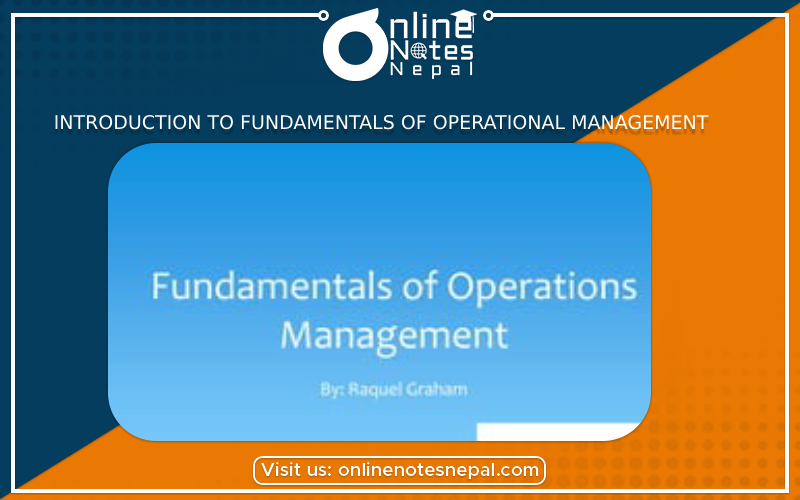Published by: Anu Poudeli
Published date: 10 Jul 2023

Operational management is a critical discipline that focuses on efficiently managing an organization's operations and activities in order to achieve operational efficiency and reach the intended goals. It entails planning, organizing, coordinating, and regulating the resources and activities required to efficiently generate goods and services.
The fundamentals of operational management include a variety of key concepts and principles that contribute to an organization's seamless operation. Let's look at some of the main components:
1.Operations Strategy: The development of a comprehensive operations strategy that is linked with the overall organizational goals is the first step in operational management. This strategy defines the organization's market strategy and operational priorities, such as cost leadership, product/service differentiation, or adaptability.
2.Process Design and Improvement: Effective procedures are the foundation of effective operational management. This entails developing and optimizing workflows, detecting bottlenecks, eliminating superfluous procedures, and streamlining tasks in order to increase production and lower costs. Continuous improvement approaches such as Lean or Six Sigma are frequently used to detect and reduce waste while improving overall efficiency.
3. Capacity Planning : Capacity planning is identifying the ideal level of resources, such as people, equipment, and facilities, needed to meet consumer demand. It guarantees that orders are filled on schedule without overburdening resources or incurring excessive costs. Effective capacity planning assists in balancing supply and demand and avoiding production bottlenecks or resource underutilization.
4. Supply Chain Management : Management of the flow of goods, services, and information along the supply chain is crucial for operational performance. Procurement, inventory management, logistics, and supplier relationship management are all part of it. A well-coordinated supply chain ensures raw material delivery on time, reduces inventory holding costs, and fosters good connections with suppliers and consumers.
5. Quality Management : Quality management is critical for ensuring high-quality products or services and long-term success. Quality management refers to the processes and strategies used to monitor and regulate quality throughout the manufacturing or service delivery process. Setting quality standards, establishing quality control systems, conducting inspections and tests, and continually improving quality through feedback and corrective actions are all part of the process.
6.Performance Measurement and Control: Operational management requires establishing key performance indicators (KPIs) to monitor the performance of various operational processes. By measuring and analyzing relevant metrics, such as productivity, efficiency, customer satisfaction, and cost performance, managers can identify areas of improvement and take corrective actions to optimize operations.
7.Risk Management: Every operation faces risks that can impact its efficiency and profitability. Operational management involves identifying and assessing risks, developing contingency plans, and implementing strategies to mitigate or manage them effectively. This includes addressing potential disruptions, such as supply chain disruptions, equipment failures, or regulatory changes.
8.Continuous Improvement: Operational management is a never-ending process of improvement. It promotes a learning and innovation culture by encouraging employees to contribute ideas for process optimization, efficiency benefits, and product/service improvements. Regular reviews and evaluations of operational performance aid in identifying areas for improvement and driving organizational growth.
Organizations can increase operational effectiveness, boost customer satisfaction, reduce costs, and gain a competitive advantage in the market by understanding and adopting these operational management concepts. To achieve long-term success, a holistic strategy, cross-departmental teamwork, and a commitment to continuous development are required.